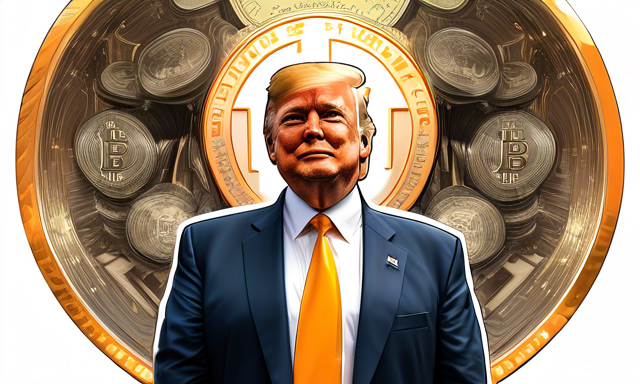Trump’s Economic Plans: A New Vision for the USA’s Financial Future 🎉
Donald Trump is set to re-enter the political arena as the 47th president of the United States, bringing forth economic strategies that prominently feature Bitcoin and measures aimed at counteracting the trend of de-dollarization to bolster the dollar’s position.
Let’s delve into the specifics of these ambitious plans.
A Combination of Bold Fiscal Policies and Bitcoin Advocacy 🚀
The recent American elections have concluded with a historic decision: Donald Trump ascends to the White House once again as the 47th president. This comeback comes with an elaborate array of economic initiatives designed to safeguard the dollar and elevate the overall U.S. economic landscape.
One of the most intriguing components of this economic strategy is the incorporation of cryptocurrencies, particularly Bitcoin, as a means to tackle pressing economic challenges, especially the growing trend of de-dollarization.
The phenomenon of de-dollarization, characterized by various nations adopting alternative currencies against the dollar, poses a significant concern for the U.S. economy. In response, Trump has unveiled a plan focusing on protective tariffs targeting countries that drift away from the dollar.
These tariffs aim to reduce reliance on foreign imports, encourage local production, and eventually enhance the dollar’s stability in the long term. Yet, his economic strategies extend beyond tariffs.
According to updates from industry sources, Trump has devised a ten-pronged approach that incorporates cryptocurrency integration to fundamentally reshape the economic framework of the United States.
A key aspect of this plan includes establishing a Bitcoin reserve designed to stabilize the economy, ensuring the U.S. retains its cryptocurrency reserves instead of liquidating them. Experts suggest that this measure could significantly influence Bitcoin’s value, possibly propelling it toward new peak levels.
Indeed, forecasts predict that Bitcoin might reach $97,000 by the end of the year, anticipating a notable increase of 28% in the upcoming months.
Navigating Regulations and Financial Institutions 🔍
Trump has articulated a viewpoint that positions the government, rather than Bitcoin, as the detrimental force affecting the dollar’s stability. This stance underscores his supportive attitude towards cryptocurrencies, and his administration’s intention to develop a more robust regulatory framework for digital currencies.
His goal is to fortify the U.S. economy, making it less susceptible to global market fluctuations by harnessing financial innovation. Concurrently, Trump aims to undertake a significant overhaul of regulatory bodies such as the Securities and Exchange Commission (SEC).
Among his initial steps would be the replacement of the current SEC chairman, viewed by Trump as an obstacle to cryptocurrency growth. This reorientation of the SEC might cultivate a more conducive environment for cryptocurrency adoption and financial transformation.
On the domestic policy front, Trump is looking to implement stringent immigration measures. Such policies may positively influence the job market, fostering employment stability and stimulating economic expansion.
A more robust and regulated labor force could align with Trump’s goals to mitigate inflationary pressures and bolster the dollar’s value.
Is a New Era for Cryptocurrencies on the Horizon? 🌟
Beyond focusing on cryptocurrencies and immigration, Trump advocates for a strong stance against the de-dollarization narrative, confronting efforts that might jeopardize the dollar’s status as the world’s reserve currency.
By executing these strategies, Trump envisions restoring the dollar’s strength and regaining trust in U.S. financial markets. The implications of these initiatives are immense.
If successful, they could not only revitalize the American economy but also pave the way for broader acceptance of cryptocurrencies within the traditional financial sector.
Market participants are closely monitoring these developments, as a surge in Bitcoin’s value could lead to increased interest in digital assets.
In sum, Trump’s return to the presidency heralds the start of an economic era centered on innovation and the safeguarding of the dollar.
His transformative ideas could generate global repercussions, impacting both established financial sectors and the cryptocurrency landscape, potentially turning the United States into a testing ground for new financial policies.
Ultimately, while the effectiveness of these proposed changes remains uncertain, one fact is clear: Trump’s economic vision is primed to challenge and reshape the global financial environment.





 By
By

 By
By
 By
By

 By
By